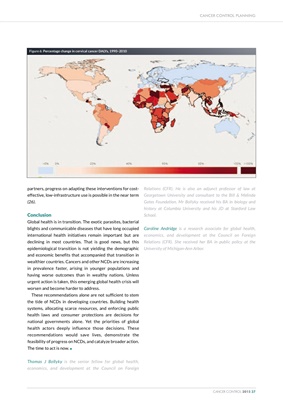
partners, progress on adapting these interventions for costeffective,
low-infrastructure use is possible in the near term
(26).
Conclusion
Global health is in transition. The exotic parasites, bacterial
blights and communicable diseases that have long occupied
international health initiatives remain important but are
declining in most countries. That is good news, but this
epidemiological transition is not yielding the demographic
and economic benefits that accompanied that transition in
wealthier countries. Cancers and other NCDs are increasing
in prevalence faster, arising in younger populations and
having worse outcomes than in wealthy nations. Unless
urgent action is taken, this emerging global health crisis will
worsen and become harder to address.
These recommendations alone are not sufficient to stem
the tide of NCDs in developing countries. Building health
systems, allocating scarce resources, and enforcing public
health laws and consumer protections are decisions for
national governments alone. Yet the priorities of global
health actors deeply influence those decisions. These
recommendations would save lives, demonstrate the
feasibility of progress on NCDs, and catalyze broader action.
The time to act is now. l
Thomas J Bollyky is the senior fellow for global health,
economics, and development at the Council on Foreign
Relations (CFR). He is also an adjunct professor of law at
Georgetown University and consultant to the Bill & Melinda
Gates Foundation. Mr Bollyky received his BA in biology and
history at Columbia University and his JD at Stanford Law
School.
Caroline Andridge is a research associate for global health,
economics, and development at the Council on Foreign
Relations (CFR). She received her BA in public policy at the
University of Michigan-Ann Arbor.
CANCER CONTROL PLANNING
CANCER CONTROL 2015 37
Figure 6: Percentage change in cervical cancer DALYs, 1990-2010